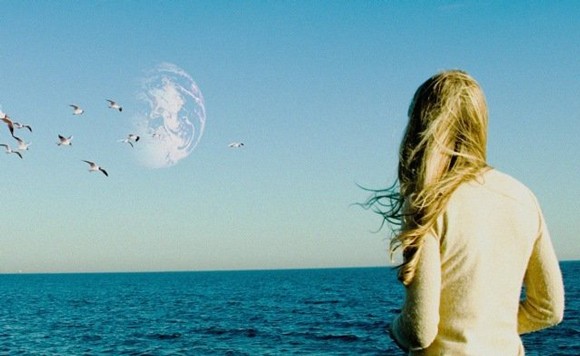
Have you ever wanted to talk to yourself? No, not in your head, actually talk to yourself?
That idea was the seed for Mike Cahill and Brit Marling as they sat down to write Another Earth. But in order to come face to face with one’s doppelgänger, the pair turned to the realm of science fiction and decided to bring a mirror Earth into orbit – an “Earth 2”, depending on your level of narcissism. The promise of interplanetary travel to an environment as familiar as your childhood neighborhood would fill everyone on either Earth with a sense of wonder and awe, two things in short supply these days.
However, rather than get bogged down in a heap of scientific mumbo jumbo, Cahill and Marling use current theories as the backdrop, knowingly letting go of aspects science aficionados might scoff at because the story is first and foremost about people. Two people to be exact. Rhoda (Marling) is a young woman preparing to study at MIT, fiercely intelligent and just as beautiful. John (William Mapother) is a talented composer and professor at Yale with a wife and young child.
One night their lives cross paths and alter the trajectory of their futures in an uncertain and unbalanced fashion – just as the rest of the world discovers theirs isn’t the only Earth in the solar system. Four years later, Rhoda seeks John out, and the pair embark on a treacherous relationship, bound to come crashing down on top of them. It’s a moving portrait of two lost souls searching for the answer to a question they don’t know how to ask.
Mapother does a decent job, the need for seclusion and self-loathing evident on his face like a big red X. And while his star doesn’t shine as bright, acting is a partnership and playing off of him, Marling delivers a tremendous performance – shading Rhoda with every emotion between pure joy and utter despair. Even without dialogue, she speaks volumes, drawing the audience deeper and deeper into her troubled psyche. (Keep an eye out for her in the future, given the chance she’ll be making quite a splash soon.)
Of course, the performances drive the film but not to be forgotten is the sure, guiding hand of Cahill. In addition to co-writing the screenplay, he’s the director, producer, cinematographer, editor, camera operator, and probably ten other things not listed in the credits. He managed to keep a constant tone and tension to the entire proceedings while also showing off a talent for visually striking imagery. His use of grain, incorporation of special effects, and understanding of what’s emotionally required from each scene elevates the film from your average independent affair.
Helping the entire production is some very well-thought-out music from Fall On Your Sword. They mixed electronic and classical compositions into the mix, providing a wonderful balance that spoke to both the sci-fi and the human drama elements of the film. And rather than compete with the images, it lays out the emotional tapestry without pushing it on the audience. Reminiscent of a cross between 2008’s Quiet City and Jon Hopkins’ work in last year’s Monsters, the music also works wonderfully on its own – not just as it accompanies the film.
Cahill, the cast, and the crew have managed an increasingly rare occurrence: an original idea fully realized and presented to the movie-going public. While a larger budget would surely have helped things along (they had less than $100K), being restricted monetarily forces creativity and inventiveness. Good filmmakers respond accordingly, and Cahill clearly knows his craft and it’ll be exciting to see what he can do given more resources.
Now, that is not to say he’s created a perfect film if ever such a thing could exist. Being so close to the material, some story transitions feel a bit too sharp. Most notably, the manner in which John and Rhoda’s relationship evolves into more than a friendship seems to come a bit too quickly, as if one more scene showing this inevitability was left off the finished film. Also, Rhoda’s family is given short shrift, coming off as nearly unnecessary weighed against the focus of the story as a whole.
Still, those are minor complaints, and upon exiting the theater, a wave of satisfaction and appreciation washed over me. It’s a feeling I only get once or twice a year from films. For anyone who fancies themselves a fan of original thought or enjoys discussing the ramifications of a film long after the credits roll, I implore you to see Another Earth. It’ll be one of the very few movies that I’ll be sure to remember once the year has gone by.
GRADE: A-
Another Earth hit theaters on July 29, 2011 and is rated PG-13 for disturbing images, some sexuality, nudity and brief drug use.






